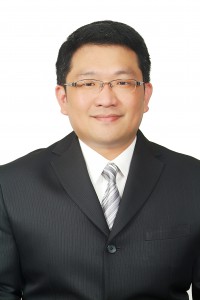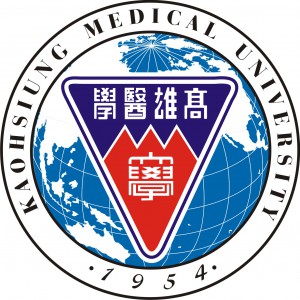跳至主要內容
English Version
Lin, Ming-Hong Ph.D.


Affiliation:
1. Department of Microbiology and Immunology, School of Medicine, College of Medicine, Kaohsiung Medical University, Kaohsiung City, Taiwan
2. Department of Medical Research, Kaohsiung Medical University Hospital, Kaohsiung City, Taiwan
Current Position: Assistant Professor
Office Location: MR0341-A, 3rd Floor, Medical Research Building, KMU
Laboratory Location: MR0307, 3rd Floor, Medical Research Building, KMU
TEL: +886-7-312-1101 ext. 2150 #11 (Office) or #20 (Lab)
Specialty:
Autoimmunity, Gastrointestinal Immunology, and Tumor Immunology
Ph.D. degree, National Defense Medical Center, Taiwan
Bio-bibliography:
Professor Ming-Hong Lin was born in Chiayi County, Taiwan. He finished his Bachelor degree from Department of Biological Sciences, National Sun Yat-Sen University (NSYSU), Taiwan R.O.C. in 1999, completed his Master degree from the Department and Graduate Institute of Life Sciences, National Tsing Hua University (NTHU) in 2001, and received the Ph.D. degree from Graduate Institute of Medical Sciences, National Defense Medical Center (NDMC) in 2012. Honorably, he has been conferred the International Award by the Japanese Association for Laboratory Animal Science (JALAS) in May 2012 in Japan. He served as a full-time postdoctoral fellow in the Department and Graduate Institute of Microbiology and Immunology, NDMC from September 2012 to July 2014. Next, he applied for a postdoctoral scholar supported by the Ministry of Science and Technology (MOST), Taiwan R.O.C., and executed the research project in NDMC from August 2014 to January 2015. Simultaneously, he was also an adjunct Assistant Professor in the Department and Graduate Institute of Microbiology and Immunology, NDMC from August 2013 to January 2016. Subsequently, he already moved to the Department of Microbiology and Immunology, Faculty of Medicine, College of Medicine, Kaohsiung Medical University (KMU), Taiwan on 1st February 2016 and serves as a full-time Assistant Professor. One of his academic research interests has focused on autoimmune diseases to further dissect the molecular mechanisms of diseases. Besides, Professor Lin recently began to investigate the tumor microenvironment of gastric cancer and its underlying mechanisms of cancer metastasis. Also, he already established a high-fat diet (HFD)-fed animal model for the study of non-alcoholic fatty liver disease (NAFLD) and its progression cumulating in hepatocellular carcinoma (HCC). Both later projects are now supported by the MOST research grants. Professor Lin highly expects to explore the novel insights of findings into understanding the molecular mechanisms of those diseases, further making translational medicine feasible! Finally, the long-term goal of his researches is to develop innovative therapeutic strategies against diseases in the future.
Research Description:
Our laboratory uses transgenic, knockdown, and knockout mouse models to broadly and deeply investigate the immune-modulation of gene manipulation on the pathogenic processes of autoimmune diseases. The long-term goal of these works is to further develop the innovative treatment strategies against diseases at future.
Currently, our laboratory research interests center on two critical issues about autoimmune diseases, including inflammatory bowel disease (IBD) and autoimmune encephalomyelitis (Experimental autoimmune encephalomyelitis, EAE). Since mice harboring Blimp-1 deficient T cells spontaneously developed severe and lethal colitis at the age of 10-week-old, the body weight of these mice significantly dropped and they have severe diarrhea and rectal prolapse. Due to the chronic malnutrition, the high mortality of Blimp-1-deficient mice was observed from 15 to 25-week-old of age. Because this animal model of colitis mainly resulted from the loss function of single gene, research aims of our laboratory are raised to further investigate the underlying molecular mechanisms of colitis pathogenesis in mice with T cell-specific Blimp-1 deficiency. In addition, the research interest in this laboratory also focuses on the SUMO post-translational modification of c-Maf in T cells of autoimmune encephalomyelitis. Currently, our laboratory uses wild type and mutant (K33R) SUMO site of c-Maf transgenic mouse models under the control of a T cell-specific manner to further investigate the impact of SUMO modification of c-Maf in T cells of autoimmune disease. Our preliminary results indicated that the clinical score and severity of autoimmune encephalomyelitis are significantly exacerbated in SUMO-defective c-Maf transgenic mice compared to wild type c-Maf transgenic and control counterparts. However, the underlying mechanisms of c-Maf SUMO in T cells of autoimmune subject are still unclear. Our current goal is to dissect whether the SUMO modification of c-Maf in T cells critically immuno-modulates the pathogenesis of autoimmune encephalomyelitis.
Selected Recent Publication:
My NCBI/My Bibliography Website
Google Academic Search/Citation Reports Website
-
H.-Y. C. Chiou, S.-H. Huang, C.-H. Hung, S.-M. Tsai, H.-R. Kuo, Y.-R. Huang, J.-W. Wang, S.-C. Chen, C.-H. Kuo, D.-C. Wu, S.-K. Huang, S.-H. Hsu, M.-H. Lin* Hyperbaric oxygen therapy alleviates the autoimmune encephalomyelitis via the reduction of IL-17A and GM-CSF production of autoreactive T cells as well as boosting the immunosuppressive IL-10 in the central nervous system tissue lesions; BIOMEDICINES 2021 Aug, 9 (8), 943; 責任作者 (2020 JCR IF=6.081, R/C=32/275, PHARMACOLOGY & PHARMACY-SCIE)
-
C.-H. Li, H.-Y. C. Chiou, M.-H. Lin, C.-H. Kuo, Y.-C. Lin, Y.-C. Lin*, C.-H. Hung*, C.-H. Kuo* Immunological map in COVID-19; Journal of Microbiology Immunology and Infection 2021, 12 May In press (Review); 共同作者 (2020 JCR, IF=4.399; R/C=28/92, INFECTIOUS DISEASES-SCIE)
-
L.-T Wang#, M.-H. Lin#, K.-Y. Liu, S.-S Chiou, S.-N. Wang, C.-Y. Chai, L.-W. Tseng, H.-Y. C. Chiou, H.-C. Wang, K. K. Yokoyama, S.-H. Hsu*, S.-K. Huang*; Wntless is essential in controlling dendritic cell homeostasis via Wnt signaling-independent mechanism;Autophagy 2021 Apr 14, 1-14. DOI: 10.1080/15548627.2021.1907516; 共同第一作者 (2020 JCR, IF=16.016; R/C=14/195, CELL BIOLOGY-SCIE)
-
M.-H Tsia, C.-H Lin, K.-W Tsai, M.-H Lin, C.-J Ho, Y.-T Lu, K.-P Weng, Y. Lin, P.-H Lin, S.-C Li* S100A6 promotes B lymphocytes penetration through blood-brain barrier in autoimmune encephalitis; Frontiers in Genetics 2019 November, 10 (29), 1188-1196; 共同作者(2020 JCR, IF=4.599; R/C=48/175, GENETICS & HEREDITY-SCIE)
-
M.-H. Lin, K.-M. Lee, C.-Y. Hsu, S.-Y. Peng, C.-N. Lin, C.-C. Chen, C.-K. Fan, P.-C. Cheng* Immunopathological effects of Agaricus blazei Murill polysaccharides against Schistosoma mansoni infection by Th1 and NK1 cells differentiation; International Immunopharmacology 2019 Aug, 73, 502-514; 第一作者 (2020 JCR, IF=4.932; R/C=69/275, PHARMACOLOGY&PHARMACY-SCIE) INTIMP Online
-
H.-Y.C. Chiou, M.-W. Lin, P.-J. Hsiao, C.-L. Chen, S. Chiao, T.-Y. Lin, Y.-C. Chen, D.-C. Wu, M.-H. Lin* Dulaglutide modulates the development of tissue-infiltrating Th1/Th17 cells and the pathogenicity of encephalitogenic Th1 cells in the Central Nervous System; International Journal of Molecular Sciences 2019 Mar, 20(7), 1584; 責任作者 (2020 JCR, IF=5.932; R/C=67/298, BIOCHEMISTRY&MOLECULAR BIOLOGY-SCIE) PubMed
-
P.-C. Wu, W.-L Hsu, C.-L. Chen, C.-F Lam, Y.-B. Huang, C.-C. Huang, M.-H. Lin*, M.-W. Lin*; Morphine Induces Fibroblast Activation through Up-regulation of Connexin 43 Expression: Implication of Fibrosis in Wound Healing; International Journal of Medical Sciences2018 Jun; 15(9):875-882. 共同責任作者 (2020 JCR, IF=3.738; R/C=44/169, MEDICINE, GENERAL & INTERNAL-SCIE) PubMed
-
C.-L. Chung, S.-W. Wang, R. Martin, H.-J. Knölker, Y.-C. Kao, M.-H. Lin, J.-J. Chen, Y.-B. Huang, D.-C. Wu, C.-L. Chen; Pentachloropseudilin inhibits transforming growth factor-β (TGF-β) activity by accelerating cell-surface type II TGF-β receptor turnover in target cells; Chembiochem. 2018 Apr, 19, 1-15. 共同作者 (2020 JCR, IF=3.164; R/C=37/63, CHEMISTRY, MEDICINAL-SCIE) PubMed
-
L.-L. Chang, W.-H. Hsu, M.-C. Kao, C.-C. Chou, C.-C. Lin, C.-J. Liu, B.-C. Weng, F.-C. Kuo, C.-H. Kuo, M.-H. Lin, C.-J. Wang, C.-H. Lin, D.-C. Wu*, S.-K. Huang*; Stromal C-type lectin receptor COLEC12 integrates H. pylori, PGE2-EP2/4 axis and innate immunity in gastric diseases; Scientific Reports 2018 Feb 28;8(1):3821. 共同作者 (2020 JCR, IF=4.379; R/C=17/73, MULTIDISCIPLINARY SCIENCES-SCIE) PubMed
-
M.-W. Chien, M.-H. Lin, S.-H. Huang, S.-H. Fu, C.-Y. Hsu, B.L. Yen, J.-T. Chen, D.-M. Chang and H.-K. Sytwu; Glucosamine modulates T cell differentiation through downregulating N-linked glycosylation of CD25; Journal of Biological Chemistry 2015 Dec 4;290(49):29329-44. (2020 JCR, IF=5.157; R/C=86/298, BIOCHEMISTRY & MOLECULAR BIOLOGY-SCIE) PubMed
-
W.-B Wang, M.-L Yen, K.-J Liu, P.-J Hsu, M.-H Lin, P.-M. Chen, P.-R. Sudhir, C.-H. Chen, C.-H Chen, H.-K. Sytwu, B.L. Yen; IL-25 mediates transcriptional control of PD-L1 via STAT3 in multipotent human mesenchymal stromal cells (hMSCs) to suppress Th17 responses; Stem Cell Reports 2015 September, Vol. 5: 1-13. (2020 JCR, IF=7.765; R/C=5/29, CELL & TISSUE ENGINEERING-SCIE) PubMed
-
D.-Y Hueng, W.-C. Tsai, H.-Y. C. Chiou, S.-W. Feng, Y.-F. Li, L.-C. Huang, M.-H. LinDDX3X biomarker correlates with poor survival in human gliomas International Journal of Molecular Sciences 2015 July, 16, 15578-15591. (2020 JCR, IF=5.932; R/C=67/298, BIOCHEMISTRY&MOLECULAR BIOLOGY-SCIE) PubMed
-
S.-H. Fu, M.-H. Lin, L.-T. Yeh, Y.-L. Wang, M.-W. Chien, S.-H. Lin, D.-M. Chang and H.-K. Sytwu; Targeting tumor necrosis factor receptor 1 assembly reverses Th17-mediated colitis through boosting a Th2 response. GUT 2015 May, 64 (5): 765-775. (2020 JCR, IF=23.059; R/C=3/92, GASTROENTEROLOGY & HEPATOLOGY-SCIE) PubMed
-
C.-H. Li, M.-H. Lin, S.-H. Chu, P.-H. Tu, C.-C. Fang, C.-H. Yen, P.-I. Liang, J.-C. Huang, Y.-C. Su, H.-K. Sytwu and Y.-M. A. Chen; Role of Glycine N-methyltransferase in the Regulation of T Cell Responses in Experimental Autoimmune Encephalomyelitis. Molecular Medicine 2014 December, 20 (1): 684-696. (2020 JCR, IF=6.354; R/C=59/298, BIOCHEMISTRY & MOLECULAR BIOLOGY-SCIE) PubMed
-
M.-H. Lin, L.-T. Yeh, S.-J. Chen, H.-Y.C. Chiou, C.-C. Chu, B.L. Yen, K.-I. Lin, D.-M. Chang and H.-K. Sytwu; T cell-specific BLIMP-1 deficiency exacerbates experimental autoimmune encephalomyelitis in non-obese diabetic mice by increasing Th1 and Th17 cells. Clinical Immunology 2014 Apr; 151(2):101-13. 本人為第一作者 (2020 JCR, IF=3.969; R/C=88/162, IMMUNOLOGY-SCIE) PubMed
-
F.-C. Chou, C.-C. Kuo, Y.-L. Wang, M.-H. Lin, B.L. Yen, D.-M. Chang and H.-K. Sytwu; Overexpression of Galectin-9 in Islets Prolongs Grafts Survival via Downregulation of Th1 Responses. Cell Transplantation 2013 Nov; 22(11):2135-45. (2020 JCR, IF=4.064; R/C=8/25, TRANSPLANTATION-SCIE) PubMed
-
L.-T. Yeh, S.-C. Miaw, M.-H. Lin, F.-C. Chou, S.-J. Shieh, Y.-P. Chuang, S.-H. Lin, D.-M. Chang and H.-K. Sytwu; Different Modulation of Ptpn22 in Effector and Regulatory T Cells Leads to Attenuation of Autoimmune Diabetes in Transgenic Nonobese Diabetic Mice. Journal of Immunology 2013 Jul 15; 191(2):594-607. (2020 JCR, IF=5.422; R/C=51/162, IMMUNOLOGY-SCIE) PubMed
-
M.-H. Lin, F.-C. Chou, L.-T. Yeh, S.-H. Fu, H.-Y.C. Chiou, K.-I. Lin, D.-M. Chang and H.-K. Sytwu; B lymphocyte-induced maturation protein 1 (BLIMP-1) attenuates autoimmune diabetes in NOD mice by suppressing Th1 and Th17 cells. DIABETOLOGIA 2013 Jan; 56(1):136-46. 本人為第一作者 (2020 JCR, IF=10.122; R/C=9/145, ENDOCRINOLOGY & METABOLISM-SCIE) PubMed


